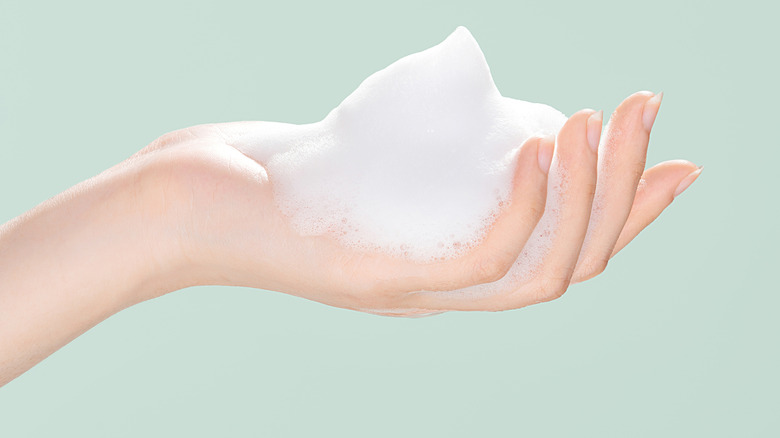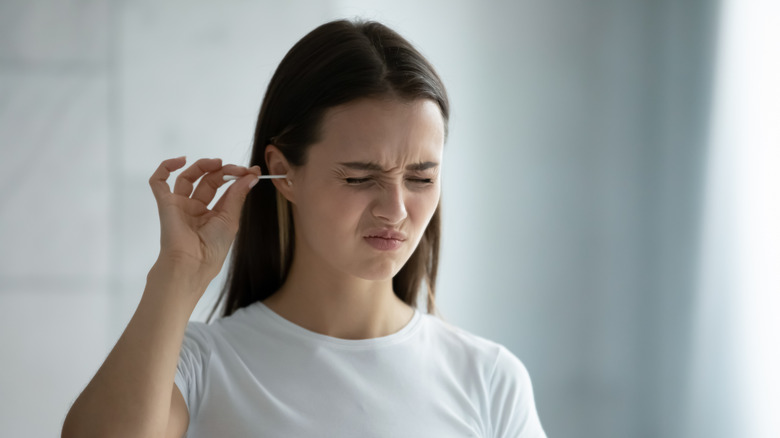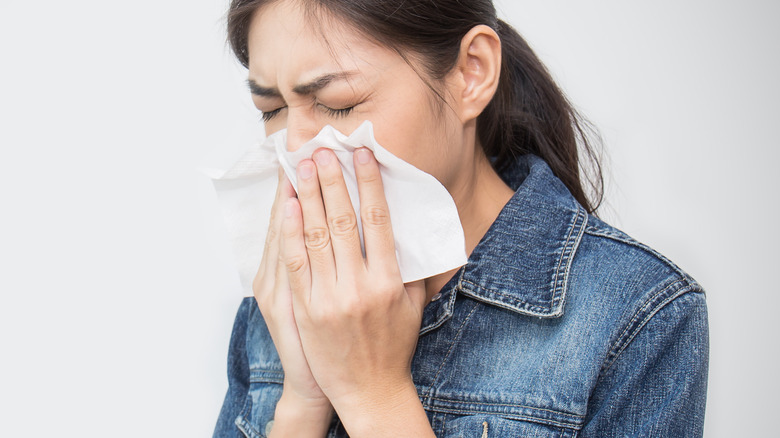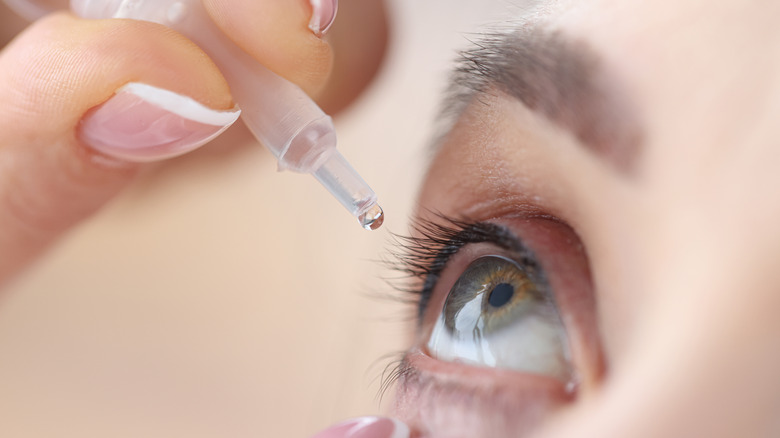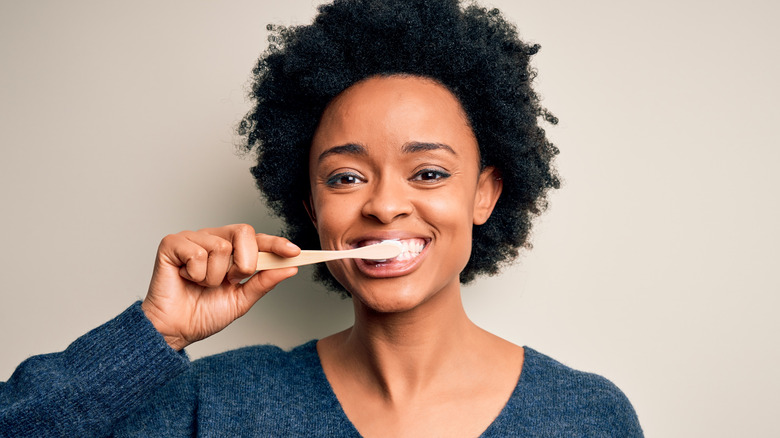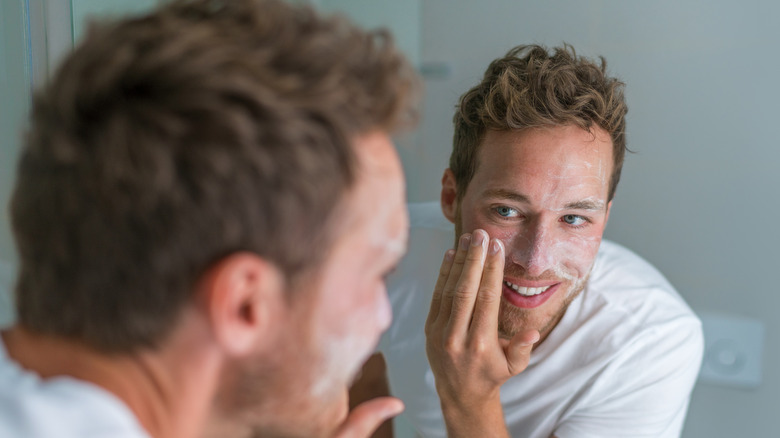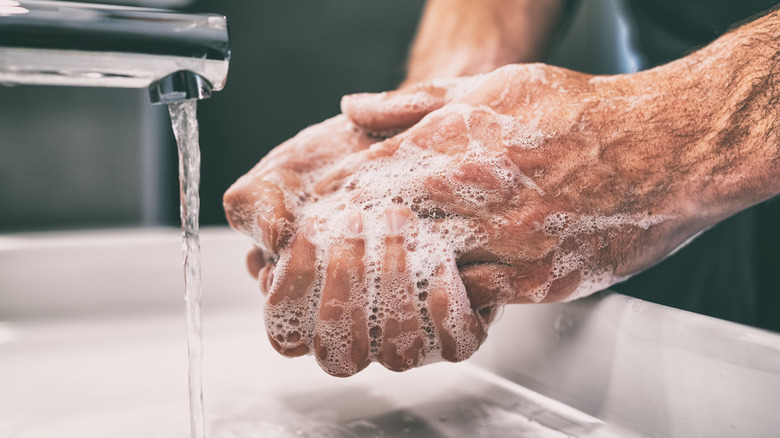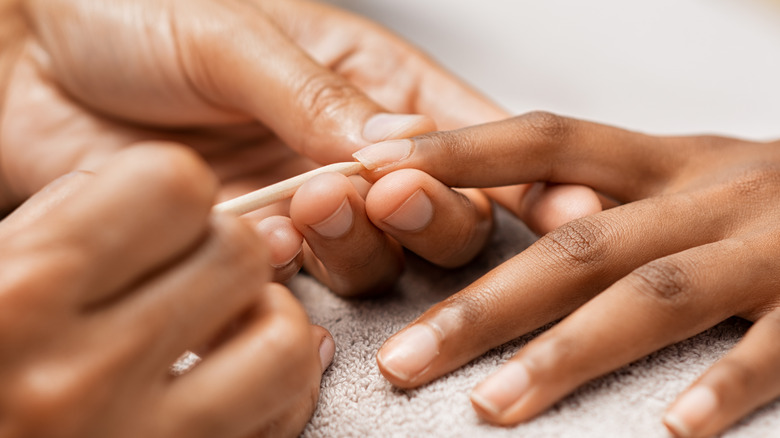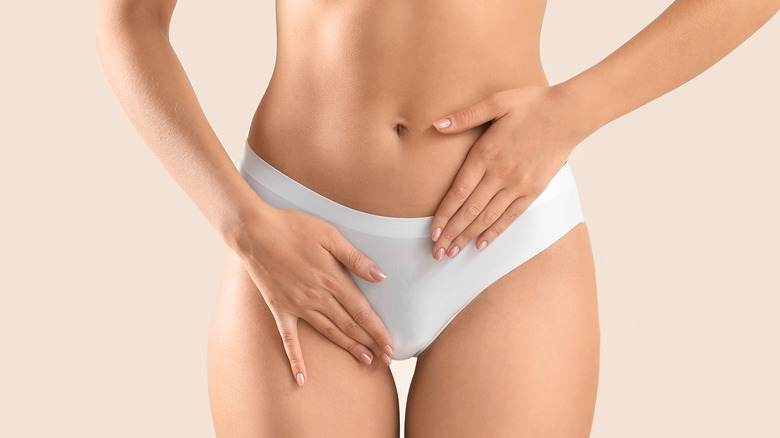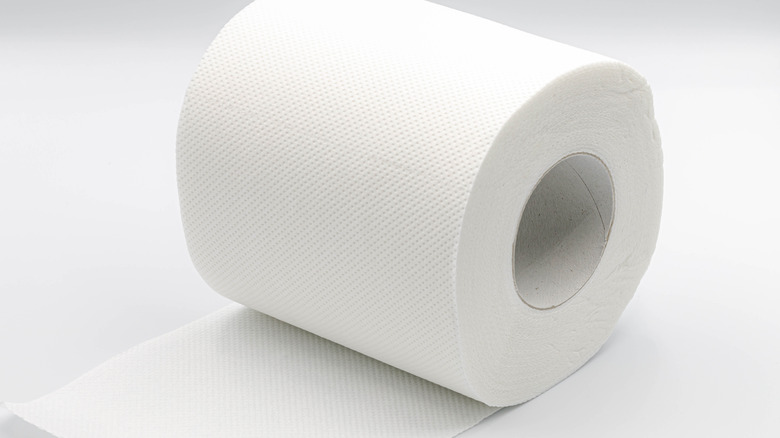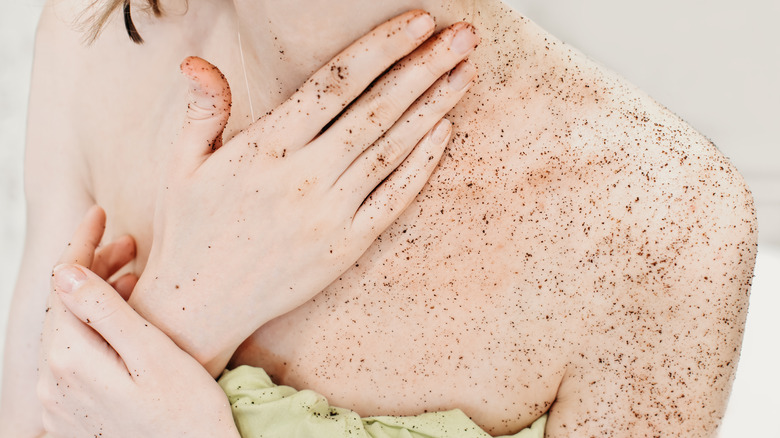Body Parts You Might Be Washing Too Much
For a lot of people, there's nothing like a hot, steamy shower. Practicing good personal hygiene isn't as black-and-white as showering every single day, and can be dependent on a host of lifestyle factors and your skin, as New York City-based cosmetic dermatologist Michele Green tells Real Simple. However, it's important to recognize the importance (and the joy) of staying on top of being clean. Not only is a good bath very enjoyable, but washing regularly helps to protect our skin from a host of less-than-desirable consequences. So what happens if you don't wash enough? "Aside from odor, you'll need to be concerned about a host of different skin issues like acne, irritation, flare-ups of existing skin conditions, and even yeast or fungal infections," Green states.
That's partly why in the United States, keeping oneself clean is big business. The average American spent almost 65 dollars per year on hair care products alone in 2020 (per Statista), and when you take into account how much various body lotions, soaps, and deodorants cost on top of that, it can be pretty pricey to maintain your hygiene.
But do all your body parts need as much care? For some parts of your body, you might be cleaning them a little too much — and doing so can lead to some fairly unpleasant side effects. Let's take a look at the top offenders in this article.
Washing your hair too often could affect your scalp
In the conversation about personal cleanliness, few things are as controversial as how often you should wash your hair.
For some, a daily shampoo is an unmissable part of the day. For others, cleaning products are banished, preferring to let the hair do its own thing. But it turns out that the answer to the perfect frequency is pretty simple. "You should wash your hair whenever your scalp feels greasy, dirty or smelly, regardless of your hair type," advises trichologist and My Hair Doctor founder Guy Parsons (via GoodtoKnow). Not washing your hair enough can result in a buildup of bacteria and oils, causing greasy hair.
However, it's entirely possible to overdo it on the hair-washing front. When you wash your hair too often, you may end up with an irritated or dry scalp thanks to its pH level rising, and when your skin starts overcompensating, you end up with a greasy head. Furthermore, washing your hair too often will "strip the hair of all its natural goodness and quite quickly it will become incredibly static," Parsons says. If you notice that your scalp is greasy despite washing it regularly, this may be a sign that you're overwashing your hair, so experiment with missing out on a wash day and seeing what the difference is.
Your ears might need less cleaning
Are you a fan of earwax? We don't know about you, but we're pretty sure not that many people would answer "yes" to that question. But in your pursuit of sparkling-clean ears and clear ear canals, it's important not to overdo it.
Cleaning your ears too much can cause your ears a world of trouble, from irritating your ear canal to increasing the chance that you'll develop earwax impaction, which in turn leads to decreased hearing and tinnitus (per the American Academy of Otolaryngology). Overcleaning your ears can also lead to an ear infection.
What's more, you need to be very careful about how you clean your ears. Using sharp objects like toothpicks or metal pins can be extremely hazardous and risk causing serious ear damage and hearing loss. Even cotton buds or ear candles can end up damaging your ear canal or eardrum. It's important to remember that the presence of earwax in our ears is completely normal, and earwax that doesn't block your ear canal or cause other problems is best left untampered with.
Your nose can get damaged by cleaning too much
The average person sneezes or blows their nose less than four times per day on average, according to a study published in Rhinology. Not that much, right? So if you just know you're one of those people who blow their nose much more than that or have a tendency to get your fingers up in your nasal passage, you might want to reconsider what your hands are doing.
The first reason for this? Blowing your nose to clean it out too much is basically pointless. "If you're sick, no matter how much you blow, your nose will keep making new mucus. You can't really 'clear' it," says Johns Hopkins School of Medicine Rhinology and Sinus Surgery division director Andrew Lane (via Men's Health).
But aside from that, blowing your nose too much increases your chances of injuring it, particularly if you're being vigorous. "Blowing your nose with too much force can actually cause breakage of vessels and undue stress," warns immunologist and allergist for the Allergy & Asthma Network Purvi Parikh. And if you think that picking your nose instead to clean it is any better, we're afraid not. Picking your nose too frequently can lead to damaging your nasal cavity, nosebleeds, sores, and an increased likelihood of infection, says Healthline.
Your eyes may clean themselves better than you think
For most people, washing out our eyes is only something we do when we've got something in them. But if you wash your eyes with relative frequency, it might be useful to know that it's potentially best left avoided until you need to.
First and foremost, our eyes are super-efficient self-cleaning machines, cleaning themselves multiple times per minute as we blink, says ophthalmologist Pradeep Sheth via Lybrate. When we alter the balance of our tear fluid, it can disrupt our pH levels and antimicrobial qualities. We also risk infecting or irritating our eyes when we wash them needlessly, especially if we're using tap water to do so, as water can pick up bacteria or parasites on its journey from the tap spout to our eyes.
Trying to clean your eyes through other habits can also end up causing more harm than good. For example, rubbing or clearing your eyes with your hands can not only lead to potentially damaging the delicate blood vessels in the area, but may also lead to eye infection by transferring harmful microbes from your fingers to your eyes, according to ophthalmologist Michael Weisberg (per Health eNews). Using over-the-counter eyedrops too frequently can also irritate your eyes.
Your mouth and teeth are sensitive areas
Okay, so we may not think of it as "washing" when we clean our mouth and teeth, but that's basically what we're doing, right? And as with many body parts, it's a delicate balance keeping the mouth and teeth clean, but not too clean.
Brushing our teeth too often can be particularly damaging to our pearly whites, with our toothbrushes gradually starting to wear away our tooth enamel and the softer dentin and cementum underneath (per Colgate). This toothbrush abrasion can lead to a companion issue, tooth sensitivity, thanks to the exposure of the dentin and its nerve endings once the tooth enamel's worn away.
Overbrushing our teeth also has an impact on our gums. When you brush your teeth too vigorously, the action can push back your gums away from the tooth, which exposes the tooth root and its cementum. When this happens, it can leave your teeth at a higher likelihood of decay, as well as more tooth sensitivity. Receding gums can't be reversed, but practicing more gentle tooth brushing can help to prevent the progression of gum recession, as Medical News Today states.
Cleaning your face too much can make it more oily
We all love to have a clean face, and for some of us, that means cleaning it a lot. But it's worth bearing in mind that the sensitive skin on your face, while needing to be kept clean and cared for, can be tended to a little too much.
It's especially important to watch out for washing your face too much when you have oily skin or tend towards developing acne, which is a common impulse to keep your face clean, according to Healthline. But doing this may dry out your skin, and the result of this is that your skin "does whatever it needs to do to regain moisture," says licensed aesthetician Stephanie Ivonne. The unfortunate effect of this is that it makes your "sebum production work in overdrive, causing more oil and more acne than there was originally," Ivonne states. This, of course, is the opposite of what you want to happen.
That's why, no matter how oily your skin is, you don't want to be washing your face more than twice a day. Aside from this, washing your face too much can irritate your skin in other ways, causing a feeling of tightness, dryness, or soreness.
Excessive handwashing can lead to skin problems
Washing our hands is a ritual that, during the COVID-19 pandemic, became suddenly way more prevalent in our everyday lives. And there's certainly no doubt that cleaning our hands regularly can help in the fight against infection and spreading bacteria, as Health Plus states.
But the line between washing our hands regularly and washing them too often is a fine one, and washing our hands too often can cause the oils on our hands to be washed away. These oils help our hands to stay healthy and our skin stay supple, and when you wash them too frequently, your skin can become dry and cracked.
This isn't just a temporary problem for some people. Over time, washing your hands too often can lead to chronic skin conditions like eczema, irritant contact dermatitis, and irreparable skin damage. Overwashing your hands can also remove the good bacteria that live on them that help to fight against disease — and can therefore (somewhat paradoxically) increase your likelihood of getting ill. If you wash your hands frequently, make sure to use a gentle soap and warm water. Also, use hand cream liberally to keep your skin supple and soft.
Fingernails can separate from the fingers when you clean them too much
No one likes having dirty fingernails, and far be it from us to tell you that you have to put up with them. But certain habits you have around your fingernails (and keeping them clean) can end up causing a bit of harm if you overdo them.
"Overly vigorous cleaning can cause the nail to separate from the underlying nail bed," according to New York-based dermatologist Dana Stern (via Women's Health Magazine). It's also important to bear in mind that what you choose to clean your nails with can have a factor in this. Nail brushes, for example, may tempt you to work harder on your nails, increasing the likelihood of damage and infections getting passed on (as they can't be sterilized).
Other practices like washing your hands too often can also have an impact on your nails, potentially causing them to become brittle, as the Cleveland Clinic states. That said, caring for your nails and cleaning them is actually pretty simple. You know that bar of regular soap you have lying around? Just sink your nails into it, Stern says. It'll "help to pull out dirt and debris and makes the whites of your nails whiter." Sounds pretty fun!
Don't overdo it on genital hygiene
Maintaining good personal hygiene around our genitals is an important practice. But because of this, it's easy to become a little too fastidious about cleaning the genitals — and this is where potential issues can occur.
The vagina and its health are maintained by microbes and good bacteria, and as an internal organ, it does not need washing (via Medical News Today). Doing so may alter your skin's pH balance and dry out the delicate area. The vulva should be cleaned with simple, gentle, unscented soap.
The penis is also an area that can be cleaned with too much frequency, and doing so may cause issues. "Washing too often can actually cause problems," explains The Derm Review's Elle McLeman to Fatherly. "The skin in this area is very sensitive and washing it more than once a day can cause irritation, dryness, and itching." Instead, wash it with gentle, unscented soap, and never use any harsh materials or cleansing products that will scrub or exfoliate the skin. If you have foreskin, make sure you clean underneath it as well.
Your butt is easily irritated
People can get a little shy when talking about keeping the butt clean, but hey, it's important to talk about. However, while it is super important to keep your anus and the area around it clean, it's also possible to go overboard, particularly after you've just been to the bathroom.
"Some people wipe so vigorously that they irritate the anal area," warns New Jersey-based AtlantiCare Regional Medical Center's chief of gastroenterology Joel Krachman (via Men's Health). When this happens, a host of pretty nasty conditions can occur around your butt, such as hemorrhoids and anal abscesses (both of which can cause a huge amount of discomfort and pain).
And if we're talking about washing your butt with water, it's also entirely possible to get too enthusiastic and risk irritation, especially if you're using a shower loofa or a similar material. Instead, wash your butt and anal area gently with soap that can build up a lather. For wiping your butt, "wipe gently, and use additional toilet paper until the paper is clean and never scrub the skin around the perineum," says Krachman. We know our moms taught us that one, but it's just helpful to recap sometimes, right?
Don't over-exfoliate
We think it's fair to say that no one's a huge fan of dead skin cells. But in your zeal to get them off of your body and reveal your fresh, new skin underneath, you might be working your skin a little too hard — and causing problems you may not have thought of.
"Over-exfoliating your skin can be just as harmful as using the wrong type of product, as it can strip your skin of natural oils and cause breakouts," states New York City-based dermatologist Jody Levine via The Healthy. When this happens, your skin can also experience inflammation and irritation, with changes in texture and potentially developing a rashlike feel (per Healthline).
Over-exfoliating your skin can also lead to a slightly tight, waxy, shiny appearance, which some can mistake for a stunning complexion. As dermatologist Aanand Geria says to Healthline, this is a sign that it's in trouble, due to "premature exposure of underlying skin." To avoid over-exfoliating and the problems that come with it, Levine recommends keeping your exfoliating to just twice a week, as this is enough to remove the dead skin without causing irritation (per The Healthy).
Cleaning your lips too much can quickly damage them
How often do you wash your lips? The answer to that question depends entirely on your definition of what lip-washing is. But if we count licking our lips as washing them (which, if you think about it, it sorta is), doing so too much can cause trouble pretty fast.
Licking our lips may feel totally natural when they're lacking in moisture. But the unfortunate side effect of this is that it can leave our lips even drier than before when our saliva evaporates from the surface, according to Healthline. Eventually, this can lead to some people developing lip licker's dermatitis, a condition that's characterized by irritation on and around the lip area.
Applying a lip balm regularly can help to combat persistent lip licking. But beware if you're in the habit of washing your lips in other ways (such as through exfoliating treatments), as these can also be done too much. Our lip skin is delicate and sensitive, and while exfoliating it to remove any dead or flaky skin caused by chapping can help to restore its softness, treatments should only be performed twice weekly at a maximum (per Healthline). Starting once a week if you're new to lip exfoliating is a good idea, to ease your lips into it.
There's no need to clean your gut
We focus so much on keeping the outsides of our bodies clean, but in recent years, the popularity of detox treatments and gut cleanses has positively boomed. These might have brought savvy marketing executives and "health" companies a pretty sweet payday, but trust us, it's not going to bring you much by way of improved health.
"Your body naturally detoxifies itself through actions in the liver, kidneys, and the colon," says gastroenterologist and Keep Her Awesome women's health advocate Roshini Raj viaThe Healthy. When you do a gut cleanse or some other detox treatment, you're not only performing an action that doesn't really need doing, but also changing the balance of your gut bacteria (which Raj says are crucial to the detoxing process).
As such, if you're detoxing your gut at all, you're probably doing it too much. Instead of this, Raj recommends prioritizing a healthy diet high in fiber, which can help your gut microbiome bloom. Gut-healthy probiotic foods like sauerkraut, kimchi, and kombucha can also help your gut flourish and stay in good order (per EatingWell).

